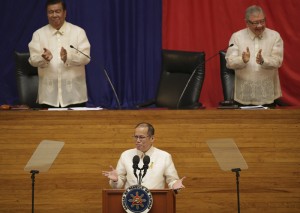Aquino emergency powers House resolution filed

Philippine President Benigno Aquino III, center, gestures as he is applauded by Senate President Franklin Drilon, left, and House Speaker Feliciano Belmonte Jr. during the start of his 5th State of the Nation Address during the joint session of the 16th Congress at the House of Representatives in suburban Quezon city, north of Manila, Philippines Monday July 28, 2014. AP/Aaron Favila
MANILA, Philippines–The House of Representatives energy committee has filed a joint resolution giving President Benigno Aquino III emergency powers to address the looming power shortage during the summer of 2015.
The filing of the resolution was delayed after the Department of Energy and the National Grid Corporation of the Philippines struggled to reconcile their projections on the expected power shortage in Luzon due to the Malampaya shutdown, increased levels of forced outages of power plants, and delays in 9 commissioning of committed power projects.
According to House Joint Resolution 21, the bill was filed to authorize Aquino “to provide for the establishment of additional power generating capacity as mandated by Republic Act No. 9136, 10 also known as the ‘Electric Power Industry Reform Act (EPIRA)’, to effectively address the projected shortage of the supply of electricity in the Luzon grid from 12 March to July 2015.”
According to the resolution, the maximum projected shortfall next year is at 1,001 megawatts (MW), of which 600 MW are needed as required dispatchable reserve, and 404 MW for required contingency reserves.
It also said that at least 15 weeks of yellow alert are projected during the critical period.
Article continues after this advertisementAccording to the resolution, “additional generating capacity shall be sourced from the Interruptible Load Program (ILP), fast tracking of committed projects, and plants for interconnection and rehabilitation.”
Article continues after this advertisementThe ILP is seen by the House energy committee as the solution to the anticipated power shortage supposedly due to the looming El Niño phenomenon, the maintenance shutdown of the Malampaya power plan, increased or continuing outages of power plants, and the delay in commissioning of committed power projects.
Under the ILP, big industrial and commercial customers who have the ability to produce their own electricity through generating sets should cut off or reduce their supplied electricity, particularly during peak periods of the day, and instead use their own generator sets.
The provision and procurement of additional generation capacity will be available on or before March 1, 2015, the resolution said.
The resolution also cited an adoption and execution of energy efficiency and conservation measures which “shall be pursued vigorously in both public and private sectors.”
The emergency powers will be effective only until July 2015 unless withdrawn sooner by the President and upon the recommendation of the Joint Congressional Power Commission (JCPC).
According to the resolution, private entities with self-generating facilities will participate in the ILP on or before December 31, 2014 to stimulate additional generation capacities.
The government is also expected to reimburse the business owners of these generators for fuel expenses and “reasonable recovery for their use,” the resolution said, adding that the reimbursement will not be subject to value-added tax.
Those businesses which have not registered under the ILP may also be manually deloaded from the grid without compensation.
All national government agencies and local government units are authorized to suspend operability of certain laws adopted for the Wholesale Electricity Spot Market, and others such as the Biofuels Act, Clean Air Act, Philippine Grid Code, Philippine Distribution Code “that may affect the operation and transmission of the contracted generation capacities under this Joint Resolution, to ensure the timely commissioning and utilization thereof.”
All government offices are also expected to retrofit their offices and buildings with energy efficient LED bulbs, air-conditioning units with inverters, and solar energy systems subject to emergency procurement procedures, the resolution read.
The President is also expected to submit a monthly report to Congress on the efficiency and effectiveness of measures under the joint resolution.
After filing, the joint resolution will be treated like any other bill and will be referred to the proper committee after first reading.
Energy committee chair and JCPC co-chair Oriental Mindoro Rep. Reynaldo Umali said they were eyeing to pass the joint resolution on third and final reading by the end of November.
RELATED STORIES
Congress closer to giving Aquino emergency powers
Petilla vows to reconcile conflicting power outlooks in 2015